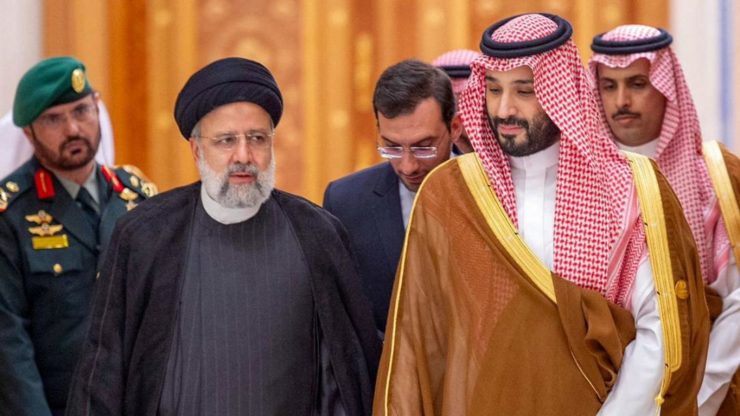
When the Iranian Foreign Minister Hossein Amir-Abdollahian visited Saudi Arabia in August, months before the start of the Gaza war, he declared that bilateral ties were “on the right track”. Later, in the second week of October, Iranian President Ebrahim Raisi and Saudi Crown Prince Mohammad bin Salman (MBS) had a telephone conversation about the situation in Palestine. Now, Ebrahim visited Saudi Arabia from November 13 to participate in the OIC-organized Gaza summit. The Saudi King himself extended the invitation. The flow of interaction shows logical progress ever since the China-brokered normalisation between Iran and Saudi Arabia in March 2023. In effect, what it means is that China’s plan for the Middle East is not only working but has, despite reports and allegations of Iranian support for Hamas aimed at derailing the US-backed Saudi-Israel peace deal, withstood the pressure of the Gaza crisis.
No doubt, the prospects of the Saudi-Israel deal are very weak, if not completely disappeared. But the reason for this is not some Iranian conspiracy but the inability of Washington to push for peace in the Middle East in a way that takes into account, or finds a just resolution of, the major crisis that has gripped the region since the fateful Balfour Declaration of 1917 – an outcome of western imperial domination. But Washington’s failure to do that has contributed to what is happening today – not only between Palestine and Israel but also between Iran and Saudi Arabia. That failure has just given these states yet another reason to stay the course of normalisation and not allow the usual suspects to derail their peace.
Now that Ebrahim will be speaking at the summit in Saudi Arabia has created a possibility of a joint Arabi-Iran position against Israel – something that has not been seen in the past decades or so. This comes against the backdrop of a realisation in Saudi Arabia – and the rest of the Arab world – of the fallacy of making peace with Israel without forcing the latter first to settle the Palestinian question, and that ignoring this resolution has a serious cost.
In this context, the calculation goes, if Saudi Arabia – and other Gulf states – revert to an era of heightened tensions with Iran and reverse the normalisation process, they stand to lose. Arab states believe that they are already facing a backlash due to their normalisation with Israel (without forcing a resolution of the Palestinian issue) and that reversing normalisation with Iran and/or not pursuing it any longer will simply add fuel to the fire.
Therefore, states like the UAE, the first one to sign the now notorious Abraham Accords, are, instead of mindlessly subscribing to the Biden administration’s narrative highlighting Iranian involvement in the Gaza crisis, allying more with China to criticise Israel. On November 7, China and the UAE jointly pushed the United Nations Security Council (UNSC) for a ceasefire in Gaza. The UAE’s representative called Israeli “indiscriminate” attacks on civilians in Gaza a flagrant violation of “international law”. The UAE – and other Arab states – have taken this position despite their reservations about Hamas or regardless of what Hamas aims to do. Their focus is Palestine, the people being killed, and the fact that Israel, backed by the US, is killing people.
This statement plus the Saudi King’s personal invitation to Ebrahim also comes against the backdrop of the drastic failure that the US Secretary of State Antony Blinken’s recent trip to the Middle East met. Whereas Blinken maintained that the US position that a cease-fire would harm Israel’s right and obligation to defend its citizens after the surprise attack by Hamas, Egypt’s Sameh Shoukry said that “We cannot accept the justification as considered as the right of self-defense, collective punishment”.
Given the dissonance and how it is presently growing, Washington will find it difficult to stay a dominant force in the Middle East, which means that its ability to manipulate the Arab-Iran ties and pit them against each other will shrink.
When Joe Biden visited Saudi Arabia in July 2022, he told Arab leaders that the US is not leaving the Middle East. “We will not walk away and leave a vacuum, to be filled by China, Russia, or Iran. . . The US is not going anywhere.” But the problem, in the context of the Gaza crisis and the context of the growing Chinese role in the region, is that the Middle East itself is no longer too eager to ‘host’ the US even if the latter wants to stay relevant – not only because the US wants to contain China but also because the Middle East sees China as a very suitable alternative to the US. In fact, the Middle East sees China as a more suitable partner because partnering with Beijing aligns more closely with the former’s goals of rapid economic modernization.
China, on the other hand, is also the only country that can act as a ‘balancer’ between Iran and the Arab world. The US cannot do that. Washington, on the contrary, sees Iran as a troublemaker and the Iran-backed Hezbollah as a “terrorist”. Blinken’s recent visit to Jordan for the Amman summit simply reinforced this message. Importantly enough, he did not find the usual buyers there ready to get US support for protection against Iran. What Washington does not realize is that the Middle Eastern states already have other sources, i.e., China and Russia, to provide similar protection against Iran via their increasing involvement in the region.
Therefore, because Washington cannot simply reverse, or ‘contain’, China’s (and Russia’s) involvement in the Middle East, it can no longer act as the sole protector for the Middle East; therefore, it cannot push the Arab world away from Iran and towards Israel either. Therefore, the Arab-Iran ties will continue to grow.
Salman Rafi Sheikh, research-analyst of International Relations and Pakistan’s foreign and domestic affairs, exclusively for the online magazine “New Eastern Outlook”.